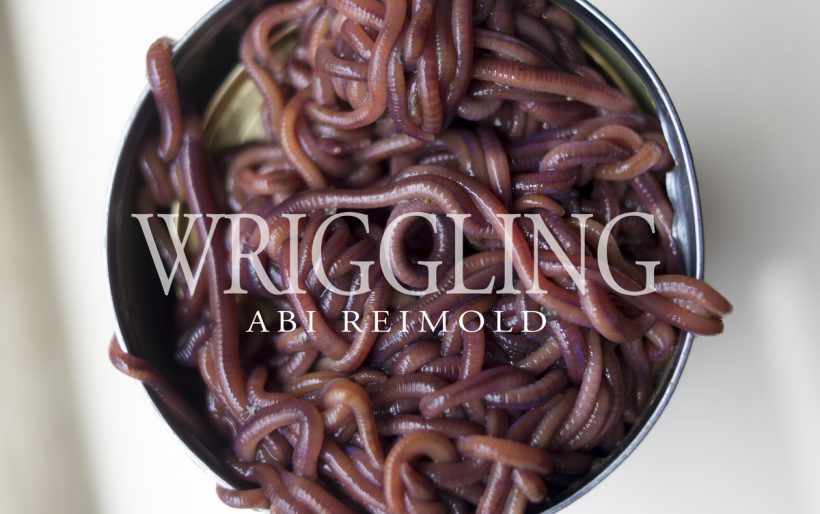
Cover art to Abi Reimold’s Wriggling | Photo courtesy of the artist
UNLOCKED: The Key’s review of Abi Reimold’s Wriggling
It should come as no surprise that, as a songwriter, Abi Reimold makes incredible use of imagery.
As we pointed out yesterday, we got to know her as a photographer before we knew her as a musician. Her visual style is one of incredible intimacy, one that gives you the sense that Reimold the person was able to completely disappear from a place in time, leaving instead Reimold the all-seeing eye to capture what’s happening around her: the brightness, the beauty, the grit, the sadness, the camaraderie and joy, all framed in one multifaceted, honest picture.
It stands to reason that an artist capable of this sort of feat – one that all visual artists, to some degree or another, aspire to – would also have a way with words. Even so, when Reimold opened her 2014 EP Forget with the lyric “Blood filling my shoes / everything I’ll lose / by letting you into my mind,” it was knock-down intense. There is so much going on there, sensory language and emotional detail, that you’re drawn in immediately, surrendering your imagination to descriptive language and evocative sounds that convey heavy states of introspection.
Today, Reimold’s debut LP Wriggling is out there in the world care of Sad Cactus Records, and this album – like her shorter releases leading up to it – has a way with words and sounds. “Arranged” kicks it off on shimmering clean tone electric guitar and a particularly vivid couplet: “little bumps that grow on skin and don’t let other people in / I’ll wash them off with astringent I’ll eat the words I never meant.”
Later, the unforgiving angular rock of “Bad Seed” dispenses with metaphor and is brutally direct – “Fuck this and fuck me in my innocence / forgetting we’re organic and not as resilient / the deadline for growing up: have I missed it yet?”
Or, more simply and mysterious: the languid Molina-esque guitar tones and buzzing bee ambience of “Dust,” where Reimold repeats a single, meditative thought like a mantra: “I will learn what dust tastes like / I am not immune.”
Description would be one thing if it was just language for language’s sake, but there’s clearly an underlying message: the album, in its themes of personal distress and discomfort, seems to more be about the bigger issue: how to cope. How to let go and accept that which can’t be controlled. I don’t believe that Reimold wants to make us the listener uncomfortable, no more than she’s trying to gross us out by photographing a can of worms on the album sleeve. But I don’t think she’s trying to work the angle of “discovering beauty in ugliness” either, since some of the album is self-consciously brutal, traversing dark paths where beauty is stifled in shadow – and those are worms after all.
The point, or my perception of the point, is that Reimold wants us to be okay with elements of discomfort and ugliness – lyrically and sonically and visually – as much as she wants to be okay with them too, as they are facets of life. The can of wriggling creatures she chose to place on the cover (and name the album after) are, or were at one point, alive.
These ideas are translated powerfully into arrangements and performances where Reimold does not hold back – her vocal two minutes into “Feed” is gripping in a way I’ve never heard from her before. On “Vessel,” she channels the aches and cries of Nina Simone. Instrumentally too, we hear Reimold and her players – Ian Amidon on guitar, Kevin Paschall on drums, Nick Morrison on bass – turning sensations into notes and riffs, from the unbridled Cursive-esque energy on “Clouded” to the spectral choral piece “Stain,” which recalls Cocteau Twins and Slowdive, and the fierce “Mask” where, as I said yesterday, Reimold recalls the dark psych-punk of Creepoid.
A particularly existential lyric on the playful “Machine” – which we spotlighted yesterday – seems to suggest that the meaning of it all is meaningless: “there’s no scheme there is no plan / we grow where our seeds happen to land.”
And while that’s a provocative thought, a piece of sonic art this thoroughly conceived and affectingly executed seems to refute it. From sorrow to joy to pain, there’s more at play across these twelve tracks and the world the describe than pure chance – which may, in the end, be the ultimate message behind Wriggling, and a strong opening statement from Abi Reimold.
Wriggling is the featured album in this edition of Unlocked. Dig into the song “Machine” in yesterday’s post and check back later in the week for a documentary, an interview and more.